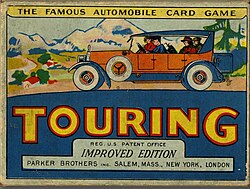
Blackjack is a casino banking game. It is the most widely played casino banking game in the world. It uses decks of 52 cards and descends from a global family of casino banking games known as "twenty-one". This family of card games also includes the European games vingt-et-un and pontoon, and the Russian game Ochko. Blackjack players do not compete against each other. The game is a comparing card game where each player competes against the dealer.
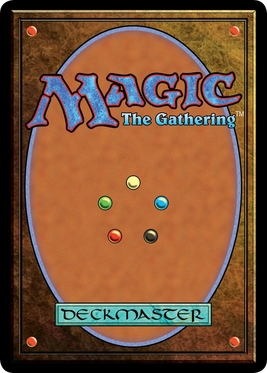
Magic: The Gathering is a tabletop and digital collectible card game created by Richard Garfield. Released in 1993 by Wizards of the Coast, Magic was the first trading card game and had approximately fifty million players as of February 2023. Over twenty billion Magic cards were produced in the period from 2008 to 2016, during which time it grew in popularity. As of the 2022 fiscal year, Magic generates over $1 billion in revenue annually.

Monopoly is a multiplayer economics-themed board game. In the game, players roll two dice to move around the game board, buying and trading properties and developing them with houses and hotels. Players collect rent from their opponents and aim to drive them into bankruptcy. Money can also be gained or lost through Chance and Community Chest cards and tax squares. Players receive a salary every time they pass "Go" and can end up in jail, from which they cannot move until they have met one of three conditions. House rules, hundreds of different editions, many spin-offs, and related media exist. Monopoly has become a part of international popular culture, having been licensed locally in more than 113 countries and printed in more than 46 languages. As of 2015, it was estimated that the game had sold 275 million copies worldwide. The original game was based on locations in Atlantic City, New Jersey, United States with the exception of Marven Gardens which is in adjacent Ventnor, NJ.
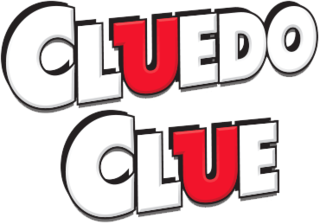
Cluedo, known as Clue in North America, is a murder mystery game for three to six players that was devised in 1943 by British board game designer Anthony E. Pratt. The game was first manufactured by Waddingtons in the United Kingdom in 1949. Since then, it has been relaunched and updated several times, and it is currently owned and published by the American game and toy company Hasbro.

Baccarat or baccara is a card game played at casinos. It is a comparing card game played between two hands, the "player" and the "banker". Each baccarat coup has three possible outcomes: "player", "banker", and "tie".
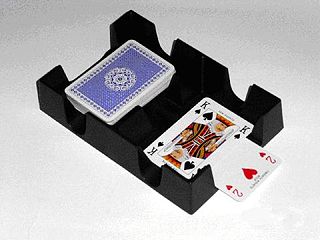
Canasta is a card game of the rummy family of games believed to be a variant of 500 Rum. Although many variations exist for two, three, five or six players, it is most commonly played by four in two partnerships with two standard decks of cards. Players attempt to make melds of seven cards of the same rank and "go out" by playing all cards in their hands. It is "the most recent card game to have achieved worldwide status as a classic".
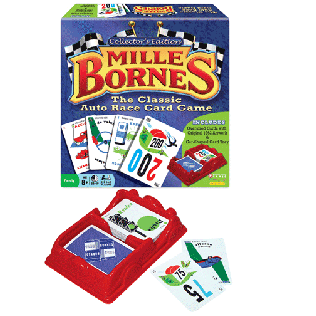
Mille Bornes (; French for a thousand milestones, referring to the distance markers on many French roads, is a French designer card game. Mille Bornes is listed in the GAMES Magazine Hall of Fame.
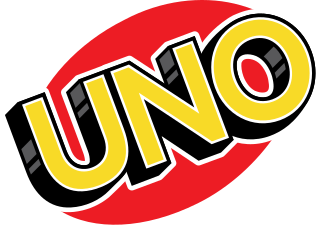
Uno, stylized as UNO, is a proprietary American shedding-type card game originally developed in 1971 by Merle Robbins in Reading, Ohio, a suburb of Cincinnati, that housed International Games Inc., a gaming company acquired by Mattel on January 23, 1992.

Sorry! is a board game that is based on the ancient Indian cross and circle game Pachisi. Players move their three or four pieces around the board, attempting to get all of their pieces "home" before any other player. Originally manufactured by W.H. Storey & Co in England and now by Hasbro, Sorry! is marketed for two to four players, ages 6 and up. The game title comes from the many ways in which a player can negate the progress of another, while issuing an apologetic "Sorry!"
Caribbean stud poker, also called casino stud poker, is a casino table game with rules derived from five-card stud poker. However, unlike standard poker games, Caribbean stud poker is played against the house rather than against other players. There is no option to bluff or deceive as this is played against the house and not other players.

Card Sharks is an American television game show. It was created by Chester Feldman for Mark Goodson-Bill Todman Productions. The game features two contestants who attempt to predict the outcome of survey questions to gain control of a row of oversized playing cards, then determine whether the next card drawn is higher or lower. The title Card Sharks is a play on the term "card sharp", a person skilled at card games.

Card counting is a blackjack strategy used to determine whether the player or the dealer has an advantage on the next hand.

Three Card Poker is a casino table game based on poker. It was designed in 1994 by Derek Webb.

Grass is a card game, first published in 1979 and now published by Euro Games and Ventura International. The game is an expanded version of the 1954 game Mille Bornes with the theme altered from car racing to cannabis dealing, with many of the cards essentially the same in their effects.

Craits is a shedding card game for two to five players derived from Crazy Eights, which forms the origin of its name. Accounts of the game's origin are unclear, with some sources alleging it was created in the late 1960s in Chicago, Illinois and others in the 1970s in Cambridge, Massachusetts.
In poker, a hole cam is a camera that displays a player's face-down cards to television viewers.

Easy Money or The Game of Easy Money was a board game introduced by Milton Bradley Company in 1935. Like Monopoly, the game is based on The Landlord's Game in the movement of pieces around the board, the use of cards, properties that can be purchased, and houses that can be established on them.

Finance, or The Fascinating Game of Finance or Finance and Fortune, is a board game originally released in 1932. The game is based on The Landlord's Game in the movement of pieces around the board, the use of cards, properties that can be purchased, and houses that can be erected on them. The game also has railroads; however, these may not be purchased. The game is a predecessor to Monopoly.
A dedicated deck card game is one played with a deck specific to that game, rather than a pack of standard playing cards. Educational packs of cards were being printed by the late eighteenth century, initially designed merely to inform, but later becoming playable games. Modern card games are often sold with non-standard distributions of suits and ranks.
Russian Schnapsen, Thousand Schnapsen, 1000 or Tysiacha is a trick-taking game of the ace–ten family for three players, the aim of which is to score over 1000 points to win the game. It is a variant of the popular Austrian game of Schnapsen. Like its parent, Russian Schnapsen features "marriages" which are worth extra points.
